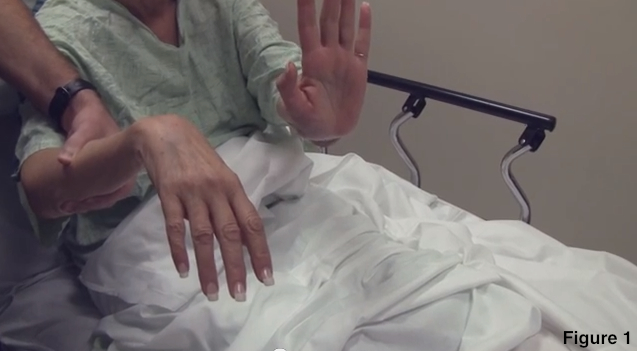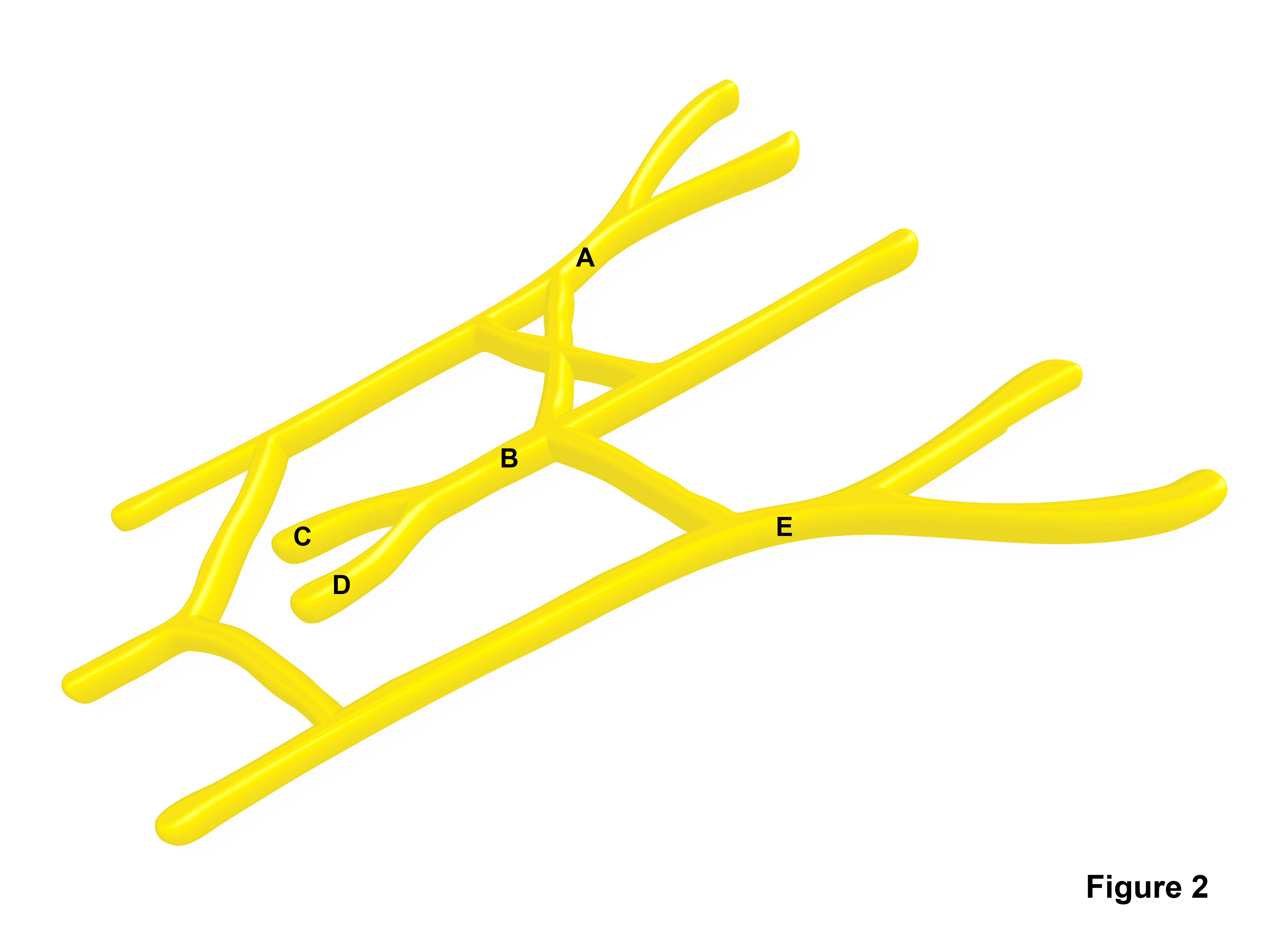WBR0553
Jump to navigation
Jump to search
| Author | [[PageAuthor::William J Gibson (Reviewed by Yazan Daaboul, M.D.)]] |
|---|---|
| Exam Type | ExamType::USMLE Step 1 |
| Main Category | MainCategory::Anatomy |
| Sub Category | SubCategory::Musculoskeletal/Rheumatology, SubCategory::General Principles |
| Prompt | [[Prompt::A 63-year-old woman presents to the emergency department concerned that she has suffered a stroke after noticing weakness in her right wrist. She explains that the day prior to presentation, she slept with her right arm suspended over the armrest of her chair. On physical examination, she is able to move the shoulder and abduct the arm without difficulty. The patient is then asked to extend both wrists, and her attempt is shown in figure 1. The remainder of the neurological exam is unremarkable. Which of the points on figure 2, which represents the right brachial plexus, is most likely injured in this patient? |
| Answer A | AnswerA::A |
| Answer A Explanation | [[AnswerAExp::Point A represents Erb point, the union of the C5 and C6 nerve roots of the brachial plexus. Injury of the C5 and C6 nerve roots is responsible for Erb palsy.]] |
| Answer B | AnswerB::B |
| Answer B Explanation | [[AnswerBExp::Point B represents the posterior cord of the brachial plexus, which gives rise to the axillary and radial nerves. While posterior cord injury may cause wrist drop due to radial nerve injury, it would also result in inability to abduct the shoulder due to involvement of the axillary nerve, which innervates the deltoid muscle.]] |
| Answer C | AnswerC::C |
| Answer C Explanation | [[AnswerCExp::Point C represents the axillary nerve, which travels anterior to the radial nerve. The axillary nerve can be injured by fractures near the surgical neck of the humerus. The axillary nerve innervates the deltoid muscle, which is responsible for abduction of the arm beyond 15 degrees. In contrast, the supraspinatus muscle, which is usually innervated by C5 and C6 (and occasionally C7), is responsible for the initial 15 degrees of shoulder abduction).]] |
| Answer D | AnswerD::D |
| Answer D Explanation | [[AnswerDExp::Point D represents the radial nerve, which travels posterior to the axillary nerve. Saturday night palsy refers to radial nerve injury due to extended compression of the radial nerve in the spiral groove. Injury to the radial nerve results in wrist drop, where patients are unable to extend their wrist.]] |
| Answer E | AnswerE::E |
| Answer E Explanation | [[AnswerEExp::Point E represents the union of the C8-T1 roots of the brachial plexus. This area can be injured in Klumpke palsy, which causes a total claw hand deformity of the hand due to lumbrical dysfunction.]] |
| Right Answer | RightAnswer::D |
| Explanation | [[Explanation::Radial nerve injury is common following extended compression of the radial nerve (C5-T1) in the spiral groove. The patient in this vignette most likely sustained radial nerve injury due to compression of the radial nerve during overnight sleep. Radial nerve palsy following such incidents is referred to as “Saturday night palsy”. Because the radial nerve innervates the extensors of the wrist, the main feature of radial nerve injury is wrist drop. Figure 1 depicts the inability of the patient to extend the right wrist. Similarly, more proximal lesions of the brachial plexus, such as posterior cord injury, can also lead to wrist drop. However, more proximal injuries will also affect the axillary nerve, which innervates the deltoid muscle, and patients will then be unable to abduct their arm on physical examination. Other causes of radial nerve injury include fracture of humeral midshaft, whereas other causes of wrist drop include lead toxicity. Educational Objective: "Saturday night palsy" refers to radial nerve injury following extended compression of the radial nerve in the spiral groove. The radial nerve innervates the extensors of the arm, and injury to the nerve results in wrist drop with inability to extend the wrist. |
| Approved | Approved::Yes |
| Keyword | WBRKeyword::Radial nerve, WBRKeyword::Brachial plexus, WBRKeyword::Radial nerve palsy, WBRKeyword::Wrist drop, WBRKeyword::Radial nerve injury, WBRKeyword::Saturday night palsy |
| Linked Question | Linked:: |
| Order in Linked Questions | LinkedOrder:: |

